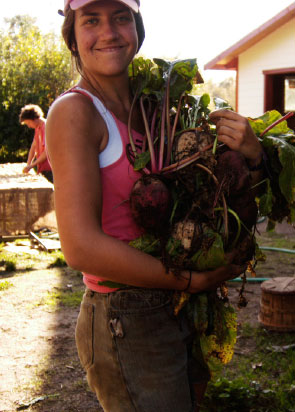Concepts and principles for developing community sustained agriculture originated in the 1960s in Japan and became known as Teikei, which means “cooperation, partnership, seeing the farmer’s face on the food.” In the 1970s in Germany and Switzerland other groups of farmers and consumers began working together as partners to found and operate farms. When originally introduced to the United States, this idea was called Community Supported Agriculture (CSA). In 1986 it took root at Indian Line Farm in Massachusetts and Temple Wilton Community Farm in New Hampshire. We followed by starting one of the first CSAs on the West Coast in 1988. Since the introduction of CSAs in the 1980s, approximately fifteen hundred to two thousand CSA farms have been developed nationwide.
The original excitement about the CSA concept (particularly on the East Coast) was the result of introducing new, successful, and alternate social and economic approaches to an agricultural landscape that was increasingly witnessing the demise of local, independent, owner-operated farming, as is still the case today. As CSA became an acronym of hope for hard pressed independent farmers, sometimes the original social and economic principles got left behind as other business manifestations adopted the term. CSA often became simply another marketing mechanism along with retail, wholesale, and farmer’s market.
Today in California we see examples at both ends of this spectrum. “The Generic Box” is on one end, where the “farmer” doesn’t actually grow anything or have a farm but buys produce in bulk and delivers it to “members” who have no particular commitment, buying one week but maybe not the ne xt. At the other end, is the CSA farm as it was originally conceived–a farm that grows all the food distributed, meets the annual operating budget through the membership, invites the community to participate in farm visits and work, and creates an awareness of commitment and relationship. We like to call this Community Sustained Agriculture to distinguish it from the variety of other models.
We believe that a community-based (rather than market-based) farm has the greatest potential to create a new, more conscious awareness of our food/economic system and is the key to the future. To provide the basis for a truly sustainable and viable agriculture we have to change the bottom line from individual to community interest. For Live Power Community Farm, CSA is not about another way of marketing, it is about sustaining our farms through the power of relationship and community and transforming our economic life so that it brings compassion, support, and neighborhood into our lives.



